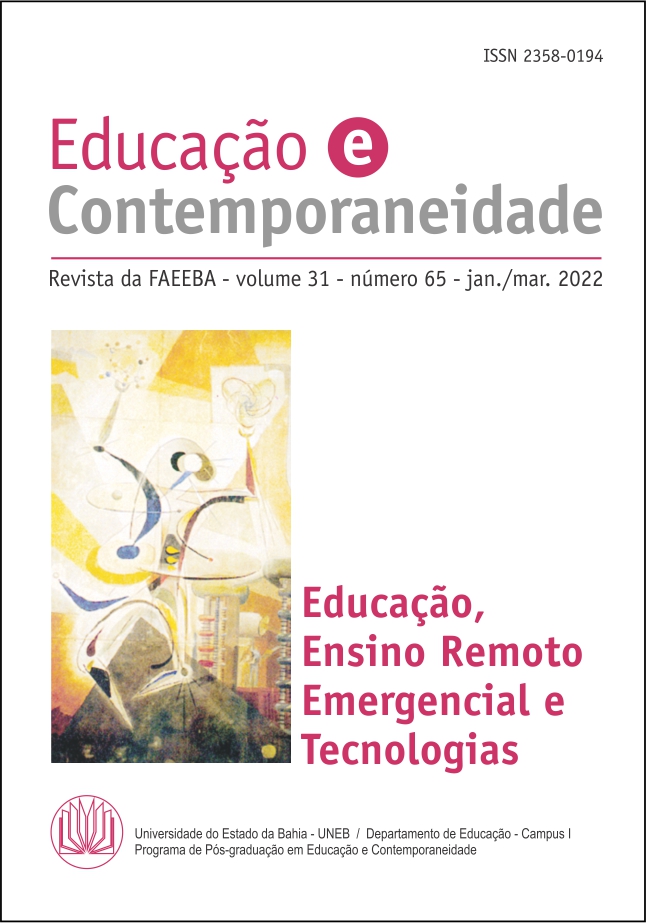Discord as an online teaching platform during the COVID-19 pandemic
DOI:
https://doi.org/10.21879/faeeba2358-0194.2022.v31.n65.p106-120Keywords:
online teaching, learning, pandemic, COVID-19Abstract
The COVID-19 pandemic forced the Spanish authorities to declare the state of alarm and suspend face-to-face education, which lead to the search for new alternatives to meet the educational demand. This study describes the experience of 20 professors from the School of New Interactive Technologies of the University of Barcelona during the first months of digital teaching with the Discord platform. Discord enables creating multiple sequences of classes, reduces system load, and can be used on various low-resource platforms and devices. Through the direct observation of classes, interviews, and a literature review, we studied (1) the online teaching skills of professors prior to the pandemic; (2) the use of Discord and teaching techniques; (3) the problems detected, and (4) their recommendations. These results may help other professors organize online teaching in critical contexts with Discord as a virtual teaching platform[1].
[1] Marta Acosta Plata
Downloads
References
BASILAIA, Giorgi, y KVAVADZE, David. Transition to Online Education in Schools during a SARS-CoV-2. Coronavirus (COVID-19) Pandemic in Georgia. Pedagogical Research, 5(4), 1-9. 2020. Disponible en: https://doi.org/10.29333/pr/7937
BOELENS, Ruth; DE WEVER, Bram, y VOET, Michiel. Four key challenges to the design of blended learning: A systematic literature review. Educational Research Review, 22, 1-18. 2017. Disponible en: https://doi.org/10.1016/j.edurev.2017.06.001
BORGE, Marcela, y MERCIER, Emma. Towards a micro-ecological approach to CSCL. International Journal of Computer-Supported Collaborative Learning, 14(2), 219-235. 2019. Disponible en: https://doi.org/10.1007/s11412-019-09301-6
CONNOR, Robert; TRAVIS, Guy; PEACE, Kaitlin; PROPPER, Brandon; HALE, Diane; ALSEIDI, Adna y VREELAND, Timothy. Using technology to maintain the education of residents during the COVID-19 pandemic. Journal of surgical education, 77(4), 729-732. 2020. Disponible en: https://doi.org/10.1016/j.jsurg.2020.03.018
GATES, Bill. The Road Ahead: Revised and Updated. London, England: Penguin Books. 1996.
GOBIERNO DE ESPAÑA. Real Decreto 463/2020, de 14 de marzo por el que se declara el estado de alarma para la gestión de la situación de crisis sanitaria ocasionada por el COVID-19. BOE-A-2020-3692. Agencia Estatal Boletín Oficial del Estado. Consultado el 20 de abril de 2020: https://www.boe.es/diario_boe/txt.php?id=BOE-A-2020-3692.
GRAHAM, Charles; WOODFIELD, Wendy y HARRISON, Buckley. A framework for institutional adoption and implementation of blended learning in higher education. The Internet and Higher Education, 18 (3), 4-14. 2013. Disponible en: https://doi.org/10.1016/j.iheduc.2012.09.003
JEONG, Heisawn, y HMELO-SILVER, Cindy. Seven affordances of computer- supported collaborative learning: How to support collaborative learning? How can technologies help? Educational Psychologist, 51(2), 247-265. 2016.
KRUGLYK, Vladyslav; BUKREIEV, Dmitriy; CHORNYI, Pavlo; KUPCHAK, Evgeniy y SENDER, Andrey (2020). Discord platform as an online learning environment for emergencies. Ukrainian Journal of Educational Studies and Information Technology, 8(2). Disponible en: https://doi.org/10.32919/uesit.2020.02.02
LEIVA, Aurora; GUTIÉRREZ, Aida; VASQUEZ, Cecilia; CHÁVEZ , Sandra y REINOSA, Enaidy. Aprendizaje colaborativo en línea y aprendizaje autónomo en la educación a distancia. Revista Científica de Ciencias Sociales de la Universidad de Cienfuegos, 30-36. 2020.
LIU, Si-Yuan; ZHANG, Yu-Ran; ZHAO, Li-Ming; YANG, Wen-Li y FAN, Heng. General monogamy property of global quantum discord and the application. Annals of Physics, 348, 256-269. 2014. Disponible en: https://doi.org/10.1016/j.aop.2014.05.015
MOHAMAD HSBOLLAH, Hafizah; IDRIS, Kamil. E-learning adoption: the role of relative advantages, trialability and academic specialization. Campus-Wide Information Systems, 26 (1), 54-70. 2009. Disponible en: https://doi.org/10.1108/10650740910921564
ODRIOZOLA-GONZÁLEZ, Paula; PLANCHUELO, Alvaro; IRURTIA, María Jesús; y DE LUIS-GARCÍA, Rodrigo. Psychological effects of the COVID-19 outbreak and lockdown among students and workers of a Spanish university. Psychiatry Research, 290. 2020. Disponible en: https://doi.org/10.1 016/j.psychres.2020.113108
RAMADHAN, Aulia. Student’s Response Toward Utilizing Discord Application as an Online Learning Media in Learning Speaking at Senior High School. ISLLAC: Journal of Intensive Studies on Language, Literature, Art, and Culture, 5(1), 42-47. 2021.
ROMAN, John. About 60% of universities reported online learning provisions in their strategic planning pre- COVID-19, but only few appeared to be prepared for a quick shift to full online programmes. UMultirank. Consultado el 21 de mayo de 2020: https://www.umultirank.org/press-media/press-releases/about-60-percent-of-universities-reported-online-learning-provisions-in-their-strategic-planning-pre-covid-19/
SINGH, Gurmak; O’DONOGUE, John y WORTON, Harvey. A Study into the Effects of eLearning on Higher education’. Journal of University Teaching and Learning Practice, 2(1), 13-24. 2005.
SUGIYONO, Cetakan. Metode Penelitian & Pengembangan. Bandung:Alfabeta. 2019.
WORLD HEALTH ORGANIZATION. WHO Director-General's opening remarks at the media briefing on COVID-19 - 11 March 2020. Consultado el 28 de octubre de 2020: https://www.who.int/director-general/speeches/detail/who-director-general-s-opening-remarks-at-the-media-briefing-on-covid-19---11-march-2020
WULANJANI, Arum. Discord Application: Turning a Voice Chat Application for Gamers into a Virtual Listening Class. 2nd English Language and Literature International Conference, 2, 115–119. 2018.
Additional Files
Published
How to Cite
Issue
Section
License
O encaminhamento dos textos para a revista implica a autorização para a publicação.
A aceitação para a publicação implica na cessão de direitos de primeira publicação para a revista.
Os direitos autorais permanecem com os autores.
Após a primeira publicação, os autores têm autorização para a divulgação do trabalho por outros meios (ex.: repositório institucional ou capítulo de livro), desde que citada a fonte completa.
Os autores dos textos assumem que são autores de todo o conteúdo fornecido na submissão e que possuem autorização para uso de conteúdo protegido por direitos autorais reproduzido em sua submissão.
Atualizado em 15/07/2017

















































